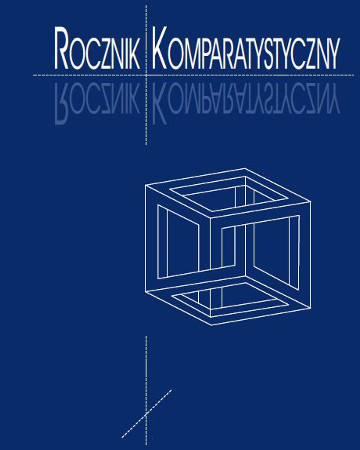





| Autorzy: |
Natalia
Gendaj-Hernik
Uniwersytet Szczeciński |
| Słowa kluczowe: | komparatystyka literacka podróżopisarstwo badania regionalne kultura argentyńska Waldo Frank Stefan Zweig José Ortega y Gasset Witold Gombrowicz |
| Data publikacji całości: | 2017 |
| Liczba stron: | 22 (55-76) |
| 1. | Ahram, Ariel. „The Theory and Method of Comparative Area Studies”. Qualitative Research 11.1 (2011): 69–90. |
| 2. | Augé, Marc. „Nie-miejsca. Wprowadzenie do antropologii nadnowoczesności (fragmenty)”. Tłum. Adam Dziadek. Teksty Drugie 4 (2008): 127–140. |
| 3. | Basedau, Matthias, Köllner, Patrick. Area Studies and Comparative Area Studies: Opportunities and Challenges for the GIGA German Institute of Global and Area Studies, 2006. http://crossroadsasia.de/fileadmin/user_upload/Literatur/Area_Studies/Basedau_Koellner_Area_Studies_and_GIGA.pdf [dostęp: 4.02.2018]. |
| 4. | Bates, Robert H. „Area Studies and the Discipline: a Useful Controversy?” Political Science and Politics 30.2 (1997): 166–169. |
| 5. | Biagini, Hugo E. Filosofía americana e identidad: El conflictivo caso argentino. Buenos Aires: Eudeba, 1989. |
| 6. | Ćwierzyńska, Dominika. „Antropologia hipernowoczesności / interdyscyplinarność”. Przegląd Kulturoznawczy 4.14 (2012): 423–431. |
| 7. | Davis, Darién J., O. Marshall, Oliver. Stefan and Lotte Zweig’s South American Letters. New York, Argentina and Brazil, 1940–42. London, Bloomsbury, 2010. |
| 8. | De Certeau, Michel. The Practice of Everyday Life. Tłum. Steven Rendall. Los Angeles: University of California Press, 2011. |
| 9. | Dymnicka, Małgorzata. „Od miejsca do nie-miejsca”. Acta Universitatis Lodziensis. Fora Sociologica 36 (2011): 35–52. |
| 10. | Frank, Waldo. Viaje por Suramérica. Tłum. Leon Felipe. Ciudad México: Cuadernos Americanos, 1944. |
| 11. | Freixa Terradas, Pau. Recepción de la obra de Witold Gombrowicz en la argentina y configuración de su imagen en el imaginario cultural argentino. http://diposit.ub.edu/dspace/bitstream/2445/42056/3/Gombrowicz-Argentina-Freixa-tesis castellano.pdf [dostęp: 4.02.2018]. |
| 12. | García Pinto, Roberto. „Los pasos de Ortega en la Argentina”. Revista de Occidente 37 (1984): 74–98. |
| 13. | Gombrowicz, Witold. Dziennik I. Kraków: Wydawnictwo Literackie, 1997. |
| 14. | ------. Trans-Atlantyk. Kraków: Wydawnictwo Literackie, 2009. |
| 15. | ------. Wspomnienia polskie. Wędrówki po Argentynie. Kraków: Wydawnictwo Literackie, 2001. |
| 16. | Huberman, Ariana. „Aclaraciones que (des)articulan la identidad”. Sujetos en tránsito. (In)migración, exilio y diáspora en la cultura latinoamericana. Red. Alvaro Fernández Bravo, Florencia Garramuño, Saúl Sosnowski. Madryt–Buenos Aires: Alianza, 2003. |
| 17. | Kamionka-Straszakowa, Janina. „Podróż”. Słownik literatury polskiej XIX wieku. Red. Alina Kowalczykowa i Józef Bachórz. Wrocław: Zakład Narodowy im. Ossolińskich, 2002. 698–703. |
| 18. | Keyserling, Hermann A., Meditaciones suramericanas. Tłum. Luís López-Ballesteros. Madrid: Espasa-Calpe, 1933. |
| 19. | Lojo, María Rosa. „Los viajeros intelectuales: Keyserling y Frank, en Historia de una pasión argentina de Eduardo Mallea”. Taller de Letras 42 (2008): 73-90 |
| 20. | Martínez, María Victoria. Los intelectuales españoles en el exilio en la Argentina, y las condiciones de inserción en su nueva realidad. Los colaboradores españoles de La Nación de Buenos Aires, en la década 1939–1949. https://www.unrc.edu.ar/publicar/borradores/Vol7/pdf/Los%20intelectuales%20espanoles%20en%20el%20exilio%20en%20la%20Argentina,%20y%20las%20condiciones%20de%20insercion%20en%20su%20nueva%20realidad.pdf [dostęp: 4.02.2018]. |
| 21. | Moreno, Segundo L. „De Emerson a Keyserling”. Monitor de la Educatión Común Año 48 (1929): 57–66. http://repositorio.educacion.gov.ar/dspace/bitstream/handle/123456789/108641/Monitor_9194.pdf?sequence=1 [dostęp: 4.09.2018]. |
| 22. | Ortega, Soledad. „Victoria Ocampo al trasluz de una doble amistad.” Revista de Occidente 7 (1984): 7–24. |
| 23. | Ortega y Gasset, José. „El Espectador II”. Obras Completas. T. 2. Madrid: Alianza, 1983. 374. |
| 24. | Lopez, Pia Maria, Scolnik, Sebastián. „«La ciudad es la huella». Entrevista con Juan Molina y Vedia”. La Biblioteca. Revista fundada por Paul Groussac 7 (2008): 26–39. |
| 25. | Piglia, Ricardo. Sztuczne oddychanie. Tłum. Barbara Jaroszuk. Warszawa: Muza, 2009. |
| 26. | Slocum, Karla, Thomas, Deborah A. „Rethinking Global and Area Studies: Insights from Caribbeanist Anthropology”. American Anthtopologist 105.3 (2003): 553–565. |
| 27. | Spivak, Gayatri Chakravorty. „Przekraczanie granic”. Tłum. Ewa Kraskowska. Niewspółmierność. Perspektywy nowoczesnej komparatystyki. Red. Tomasz Bilczewski.Kraków: Wydawnictwo Uniwersytetu Jagiellońskiego, 2009. 161–184. |
| 28. | Zweig, Stefan. The World of Yesterday. Tłum. Anthea Bell. London: Pushkin Press, 2011. Wersja Kindle. |